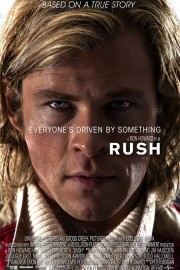Rush
Ron Howard’s favorite subject, in his best films, has been a blue collar guy who has to navigate through some tricky situations, personally or professionally, if he’s going to survive, and thrive, and be the best versions of themselves. On the surface, it’s hard to see the similarities between the astronauts of “Apollo 13” and the morgue workers of “Night Shift” and the parents of “Parenthood” and the Formula 1 racers of “Rush,” his newest film, but look just below the surface, and it’s easy to see what excites Howard as a director.
With “Rush,” Howard returns to the real life drama of “Apollo 13,” “Cinderella Man,” “A Beautiful Mind,” and “Frost/Nixon” (also written by Peter Morgan, this film’s screenwriter), and throws us right into the rivalry of James Hunt and Niki Lauda, who thrilled Formula 1 race fans during the 1970s when they each vied for the World Championship. If you watch the film straight, without thinking about it, “Rush” comes off as just a sports racing movie, but looking closer, one sees that the film is less about the “big race,” and more about what drives both Hunt and Lauda, and how circumstance pushes them both to rise to the challenge the other one poses. “Days of Thunder,” this is not, and as much of a guilty pleasure that NASCAR flick is, I couldn’t be happier.
Hunt and Lauda’s rivalry begins in 1970, when they’re both on the Formula 3 circuit. Hunt is a brash, popular talent– fierce behind the wheel, charismatic in the pits, and popular with the ladies. Lauda, meanwhile, is a bit of a prick all around, but he has a gift of being not only a precision driver, but also an expert of getting as much speed as he can out of his vehicle. Still, Lauda is the first one of them to make it to Formula 1, even if he does so by buying his way in (he comes from a wealthy family, although his father has disowned him), and Hunt follows right behind him. That’s when the things really kick into high gear, coming to a head midway during the 1976 season, when the two clash over whether to cancel a race on a dangerous track, made even more dangerous by heavy rainfall. The race goes on, but Lauda gets into a horrific crash, almost killing him. He survives, but is horribly disformed, and is anxious to get back on the track as Hunt starts winning, and comes close to catching Lauda in the season points championship. But can Lauda be the same driver he was before the crash, and if he is, will Hunt be able to keep up?
I’ve written a bit over the years about the soft spot I have for sports movies, and it’s because many of them follow the basic formula about an underdog that proves they have what it takes to succeed against sometimes insurmountable odds. But one of the things “Rush” does a bit differently, although it does touch on that underdog theme, is that it shows two very different people, different types of drivers, who have different things driving them to want to succeed. This is another theme of sports films, although one that didn’t really hit home with me until watching “Rush.” Where that drive comes from is something that not everyone can understand, but anybody with a passion for something, whether it’s an athlete or an artist, knows that feeling that inspires them to overcome whatever obstacles may be in their way. This is what Lauda discovers after his near-fatal crash, although it’s turned on its head after he takes the course in Japan for what will determine the season championship, during terrible conditions, leading to a choice that makes for one of the film’s best moments dramatically, since we see a genuine change in Lauda, played by Daniel Brühl in a fierce, calculating performance as a character who comes off as quite a prick, but not quite an antagonist to Chris Hemsworth’s Hunt, who has his moments of being a dick, as well. One of the strongest elements of the film Howard and Morgan have made is that we don’t look at either of these men as a hero or a villain, but rather just rivals. It keeps us interested without dumbing down the reality of the relationship these two had both on, and off, the track, and it gives “Rush” an energy unlike other sports, or racing, films we’ve seen over the years.
The overall look of the film Howard has crafted aids in that, and it’s unlike anything else the director has ever made. One of Howard’s great strengths as a filmmaker has been his uncanny ability to adapt his visual approach to whatever era and story the film is about, and “Rush” is one of his very best accomplishments on that front. The cinematography, art direction, and costumes put us very much in ’70s Europe, and the lives Hunt and Lauda lived, while the editing and sound teams do wonders in putting us in the middle of the action on the track, and it’s the best racing footage we’ve ever seen in a movie that wasn’t a documentary. These are some scary tracks, and the races have some terrifying crashes, and Howard puts us in the thick of it. Add to that a score by Hans Zimmer that brings the emotions to the forefront, and it’s hard not to get caught up in the excitement, and explosive emotions, Howard brings out in “Rush.” Whether you’re a fan of Formula 1 or not, it’s easy to get sucked into the world Howard, Morgan, the cast, and crew have brought to vivid, exhilarating life.










